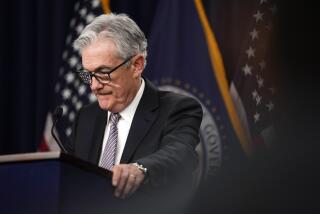European Central Bank Lifts Rates a Half-Point
- Share via
FRANKFURT, Germany — The European Central Bank, in a surprise move, ordered an aggressive half-point rise in its key short-term interest rate Thursday, and signaled that economic revival in Europe might mean more rate hikes ahead.
Lifting its key rate to 4.25% from 3.75%, the ECB said it acted to address risks of inflation stemming from strong money and credit expansion and accelerating economic growth.
Like the U.S. Federal Reserve, which on May 16 raised its key rate a half-point to 6.5%, the ECB fears that a booming economy might ignite inflation.
The difference, however, is that European economic growth remains well below the U.S. growth rate. The ECB expects the euro-bloc economy to grow 3% this year. The U.S. economy grew at a 5.4% annualized rate in the first quarter.
Asked whether the ECB saw no risk of choking off euro zone economic recovery, President Wim Duisenberg said, “The level of interest rates is still such that even after the increase today . . . it will rather promote growth than stifle it.”
As for additional rate increases, “We think with this move we have cleared the horizon, but it may be a moving horizon,” he told reporters.
The ECB, which has raised rates five times in seven months, is worried about torrid growth in Europe’s money supply. It rose at a record pace in April as lending boomed.
What’s more, the plunge in Europe’s 11-nation common currency, the euro, over the last 18 months has boosted prices of U.S. products in Europe, threatening higher inflation overall.
The euro, however, has been rallying for two weeks, after falling to a record low of about 89 U.S. cents.
On Thursday, the euro jumped as high as 96.9 U.S. cents, its strongest since April 4, just before the ECB rate decision. But the currency then slumped, ending in New York at 95.7 cents, down from 96.2 cents on Wednesday.
“After the initial euphoria, the market started to worry this might stifle some of the economic upswing in some of the countries in Europe,” said Per Norr, a trader at Den norske Bank. “Once the move was absorbed, they realized this could really affect Europe.”
European stock markets sold off on the rate-hike news, after rallying early in the day. But most closed with modest losses at worst. The German DAX share index lost 0.7%. France’s CAC-40 index edged up 0.4%, while the Spanish market gained 1%.
Economists said the ECB hike may actually help market sentiment. The move “will hopefully calm down money markets and stop [investors] perpetually betting that in six weeks’ time rates will go up again,” said Robert Lindt of ABN AMRO in London.
Some analysts saw the ECB move, which narrowed the interest rate gap between the euro zone and the United States, as a boon to the euro. Higher rates can draw more money to a currency, boosting its value.
The rate increase also could help the young central bank cement its credibility, some economists said.
Duisenberg denied the ECB council had the euro in mind when making its decision. He said that despite the recent rally from last month’s all-time lows, the single currency “did not yet reflect the fundamentals.”
But a resurgent euro is a two-edged sword: It restores Europeans’ purchasing power abroad, but also raises the cost of European exports in the United States and elsewhere.
(BEGIN TEXT OF INFOBOX / INFOGRAPHIC)
On the Same Track
The European Central Bank, like the U.S. Federal Reserve, has been raising its benchmark short-term interest rate to keep pace with a strong economy. Changes in the ECBs key rate and the Fed’s federal-funds rate since June 1999:
Source: Bloomberg News
More to Read
Inside the business of entertainment
The Wide Shot brings you news, analysis and insights on everything from streaming wars to production — and what it all means for the future.
You may occasionally receive promotional content from the Los Angeles Times.










